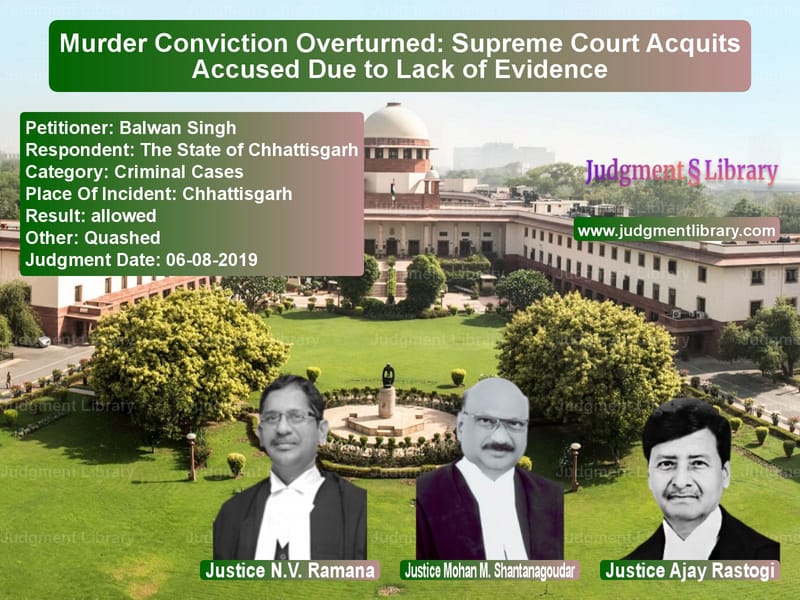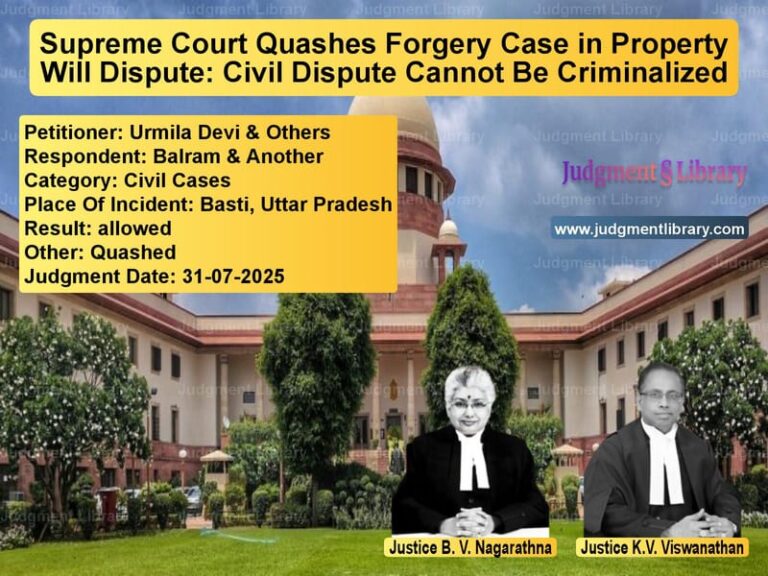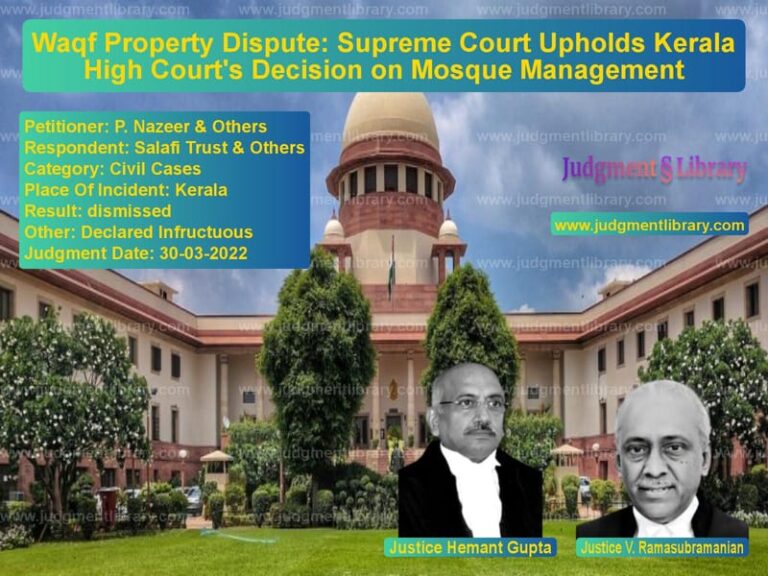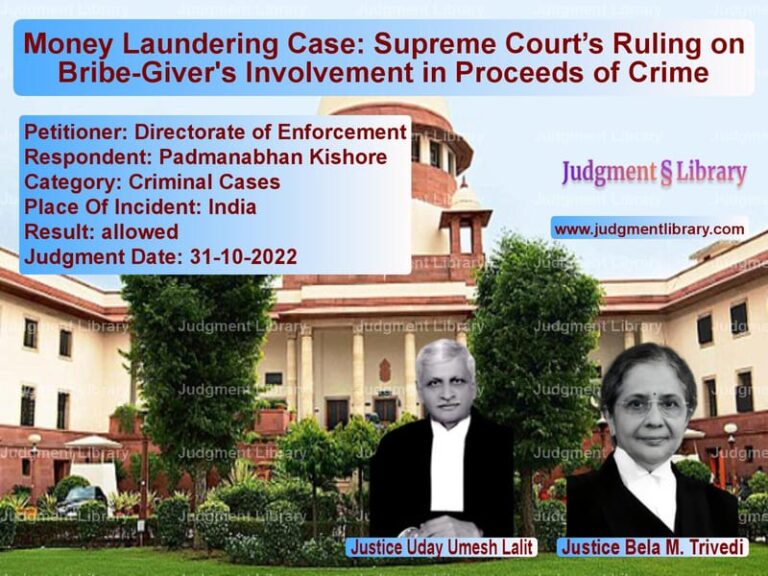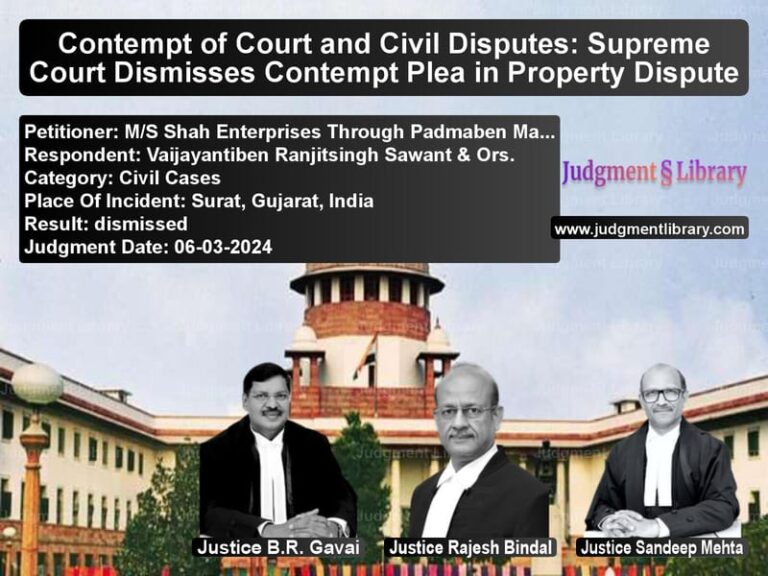Murder Conviction Overturned: Supreme Court Acquits Accused Due to Lack of Evidence
The case of Balwan Singh v. The State of Chhattisgarh is a landmark judgment where the Supreme Court overturned a murder conviction due to inconsistencies in the prosecution’s evidence. The Court examined the reliability of eyewitness testimony, delay in recording statements, and the role of circumstantial evidence before ruling in favor of the accused.
Background of the Case
The prosecution alleged that on January 22, 2007, Balwan Singh and other co-accused conspired and executed the murder of Pitambar Singh due to a prior enmity. Eyewitnesses claimed they saw the accused discussing the murder plan and later attacking the deceased with lathis and a tabbal (a sharp agricultural weapon).
The trial court, relying on the testimonies of the eyewitnesses and forensic evidence, convicted Balwan Singh and other co-accused under Sections 148 and 302/149 of the Indian Penal Code (IPC). The Chhattisgarh High Court upheld the conviction.
Balwan Singh and the co-accused challenged their conviction before the Supreme Court, arguing that the prosecution’s case was fabricated and based on unreliable evidence.
Arguments of the Parties
Appellants (Balwan Singh and Others):
- The eyewitnesses were planted and their statements were recorded eight days after the incident, raising doubts about their credibility.
- The prosecution failed to establish a motive strong enough to justify a conspiracy to commit murder.
- The forensic evidence did not conclusively link the bloodstains found on the weapons to the deceased.
- The alleged conspiracy was not proven as all accused were acquitted of charges under Section 120-B IPC.
Respondents (State of Chhattisgarh):
- The accused had a long-standing enmity with the deceased, providing a clear motive for the crime.
- The eyewitness testimonies, despite the delay in recording, were consistent and corroborated by medical and forensic reports.
- The presence of human blood on the seized weapons and the absence of an alternative explanation by the defense confirmed the involvement of the accused.
Supreme Court’s Observations
The Supreme Court scrutinized the evidence presented by the prosecution and highlighted several inconsistencies:
- The delay in recording the statements of key eyewitnesses was unexplained and suspicious.
- The forensic report did not confirm that the blood found on the weapons matched the blood group of the deceased.
- None of the independent witnesses confirmed the presence of the accused at the scene of the crime.
The Court emphasized:
“Mere presence of human blood on a weapon is not sufficient to convict unless the prosecution proves that the blood belongs to the deceased.”
Regarding the credibility of the eyewitnesses, the Court noted:
“Eyewitness accounts recorded after a significant delay, without a reasonable explanation, must be viewed with caution.”
Final Judgment
The Supreme Court set aside the convictions of Balwan Singh and the co-accused:
“Since the prosecution has failed to prove its case beyond reasonable doubt, the conviction of the appellants cannot be sustained.”
All accused were acquitted, and the Court directed their immediate release unless required in any other case.
Key Takeaways from the Judgment
- Eyewitness testimony must be recorded without undue delay to be considered credible.
- Forensic evidence must conclusively link the accused to the crime scene.
- Acquittal under conspiracy charges (Section 120-B IPC) weakens the prosecution’s case when the crime is alleged to have been premeditated.
- Prosecution must prove the guilt of the accused beyond a reasonable doubt to sustain a conviction.
Implications of the Judgment
This judgment reinforces the principle that criminal convictions cannot be based on mere suspicion. The ruling sets a precedent that delays in recording eyewitness statements and weak forensic evidence can lead to acquittals. It also highlights the need for trial courts to critically analyze prosecution evidence before delivering judgments.
Conclusion
The Supreme Court’s decision in this case underscores the importance of fair trial principles. By acquitting the accused, the Court upheld the doctrine of ‘innocent until proven guilty’ and reinforced the need for credible and reliable evidence in criminal trials. This ruling serves as a crucial guideline for courts dealing with cases where prosecution evidence is inconsistent or unreliable.
Petitioner Name: Balwan Singh.Respondent Name: The State of Chhattisgarh.Judgment By: Justice N.V. Ramana, Justice Mohan M. Shantanagoudar, Justice Ajay Rastogi.Place Of Incident: Chhattisgarh.Judgment Date: 06-08-2019.
Don’t miss out on the full details! Download the complete judgment in PDF format below and gain valuable insights instantly!
Download Judgment: Balwan Singh vs The State of Chhatti Supreme Court of India Judgment Dated 06-08-2019.pdf
Direct Downlaod Judgment: Direct downlaod this Judgment
See all petitions in Murder Cases
See all petitions in Bail and Anticipatory Bail
See all petitions in Judgment by N.V. Ramana
See all petitions in Judgment by Mohan M. Shantanagoudar
See all petitions in Judgment by Ajay Rastogi
See all petitions in allowed
See all petitions in Quashed
See all petitions in supreme court of India judgments August 2019
See all petitions in 2019 judgments
See all posts in Criminal Cases Category
See all allowed petitions in Criminal Cases Category
See all Dismissed petitions in Criminal Cases Category
See all partially allowed petitions in Criminal Cases Category

